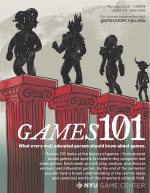Some news about classes and the new minor at the New York University Game Center this fall.
I will be teaching a new “Advanced Topics in Game Studies” class which explores foundational issues in game studies in combination with a current topic (in this case “gamification”). (Details below.) For those interested and in the area, but not at NYU, PhD students at one of the schools in the Inter-University Doctoral Consortium should find it straightforward to sign up.
Game Design Minor
Starting this fall semester, we are proud to announce that students will be able to get a Minor in Game Design from the Game Center! This degree requires are three Game Center classes and two electives from our approved course list. Additionally, elective courses that are related to games may also be approved by Game Center faculty on a case by case basis. For a full list of pre-approved elective courses visit our website here: http://gamecenter.nyu.edu/courses If are interested in taking the minor, or have any other questions, please contact gamecenter@nyu.edu.
Fall Classes from the Game Center
We’re excited to introduce three new courses being offered by the Game Center! Along with Thinking about Games and Introduction to Game Design, we’ll be offering a large lecture course focused on game literacy (Games 101), a course which engages students with the current topics of Game Studies (Advanced Topics in Game Studies), and a game development course that will allow students to practice the skill of modding in small teams in a 3-D engine. (Game Development: Modding). For more information about any of our classes, see the text below.
Games 101
 Instructor: Frank Lantz
Instructor: Frank Lantz
Course Number: OART-UT 1600
Meeting Monday 6:20PM-9PM
Recitation Times (Students choose one section) Tuesday from 12:30PM – 3:15PM, Wednesday from 2:00PM – 4:45PM, Wednesday from 2:00PM – 7:40PM, Thursday 4:55PM – 7:40PM
Games 101 is the foundational course for the NYU Game Center. The focus of Games 101 is game literacy – a shared understanding of games as complex cultural and aesthetic objects. The class will incorporate lectures, discussion, readings, and writing assignments, but the primary activity of the class is critical play – playing games in order to better understand and appreciate them. The class will cover games on and off the computer, including classic and contemporary board and card games, sports, and games on the PC, internet, and consoles.
Introduction to Game Design
Instructor: Eric Zimmerman
Course Number: OART-UT 1605/2605
Meeting Tuesday from 9:30AM -12:15PM
Lab Time Tuesday from 6:20PM – 9:00PM
This class is an intensive, hands-on workshop addressing the complex challenges of game design. The premise of the class is that all games, digital and non-digital, share common fundamental principles, and that understanding these principles is an essential part of designing successful games. Learning how to create successful non-digital games provides a solid foundation for the development of digital games.
In this workshop, students will; analyze existing digital and non-digital games, taking them apart to understand how they work as interactive systems; create a number of non-digital games in order to master the basic design principles that apply to all games regardless of format; critique each other’s work, developing communication skills necessary for thriving in a collaborative field; explore the creative possibilities of this emerging field from formal, social, and cultural perspectives; develop techniques for fast-prototyping and iterative design that can be successfully applied to all types of interactive projects.
Thinking About Games
Instructor: Charles J Pratt
Course Number: OART-UT 1606/2606
Meeting Tuesday from 3:30PM-6:10PM
This class is an overview of the field of games that approaches them from several theoretical and critical perspectives. No special theoretical background or prior training is needed to take the course, but to have had a broad practical experience with and basic knowledge of games is a distinct advantage. Also, an interest in theoretical and analytical issues will help. You are expected to actively participate in the lectures, which are dialogic in form, with ample room for discussion.
The course will prepare the student to: Understand and discuss games from a theoretical perspective, as well as the components of a game; Apply new theories and evaluate them critically; Assess and discuss game concepts and the use of games in various contexts; Analyze games, and understand and apply a range of analytical methods.
Advanced Topics in Game Studies
Instructor: Jesper Juul
Course Number: OART-UT 1611/2611
Meeting Thursday 2:00PM – 4:45PM
Advanced Topics in Game Studies is a research-focused course that examines methodological and foundational issues in the study of video games. In addition, a current topic relating to video game culture, design, or theory will be explored every semester. The class is thereby focused on allowing students to actively participate in the development of video game theory, with specific attention to how video game studies evolve as a theoretical field, and how it interacts with changes in the design and culture of video games. The topic of this semester is is “gamification” – the use of game design in non-game contexts such as teaching, politics, or business.
Game Development: Modding
Instructor: Katherine Isbister
Course Number: OART-UT 1610/2610
Meeting Thursday from 9:30AM – 12:15PM
Lab Time Wednesday from 4:55PM – 8:25PM
In this course, students get practice building game play experiences through a series of short-cycle exercises. Students work in small teams to create and tune gaming experiences in a range of game genres, using the game engine that they will use in Game Studio (a semester-long project class). The course introduces students to production roles, playtesting, considerations of audience and platform, and other practical concerns in building games.
 Feel free to share: I am now head of the Game Art, Design and Development master’s program at KADK in Copenhagen. Application deadline for the 2016-2018 class is March 1st. Please join us!
Feel free to share: I am now head of the Game Art, Design and Development master’s program at KADK in Copenhagen. Application deadline for the 2016-2018 class is March 1st. Please join us!
